Interview With Melissa Hart
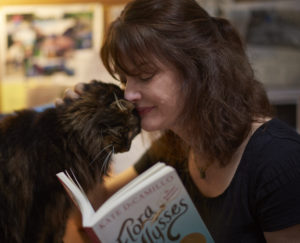 Melissa Hart! What a positive, joyful woman–and a wonderful writer and teacher who loves to lift up voices that might not otherwise be heard! Please join me as I talk with her about inclusion, empowerment, community, and diversity–all important themes in her middle-grade book coming out this week: Daisy Woodworm Changes the World .
Melissa Hart! What a positive, joyful woman–and a wonderful writer and teacher who loves to lift up voices that might not otherwise be heard! Please join me as I talk with her about inclusion, empowerment, community, and diversity–all important themes in her middle-grade book coming out this week: Daisy Woodworm Changes the World .
Diane: Welcome Melissa to WomanPause! I am so thrilled to have you here. It’s been a long time since I’ve had as wonderful, inspiring, and joy-filled an experience as I had reading your book.
Melissa: Thank you, Diane! I’m so glad you enjoyed it.
Diane: Oh my goodness! Daisy Woodworm Changes the World is so wonderful. First I must mention the diversity of characters. The book is a lesson in inclusion for sure. I’m going to name some of the main characters, and you let me know if I’ve left any out, okay?
Melissa: Sounds good!
Diane: There’s Daisy who has a lisp. She feels self-conscious about it. Her family’s struggling financially. Her parents have an incredibly embarrassing job for a kid.
Melissa: They launched their own dog poop removal business called The Poop Fairies, and they drive around in a bright yellow truck with black dalmatian spots and a tail and ears.
Diane: I love it, but Daisy doesn’t love it so much.
Melissa: Oh gosh, remember how self-conscious we all were in middle-school? That truck is humiliating.
“These Are All Characters Inspired by People in My Life”
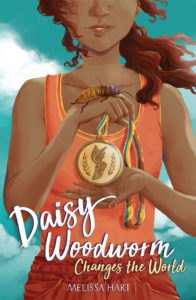 Diane: And there’s Sorrel, aka Squirrel, her brother with Down syndrome. There’s Poppy, who has two moms, and then there’s Miguel, who’s the handsome, most popular boy in the class.
Diane: And there’s Sorrel, aka Squirrel, her brother with Down syndrome. There’s Poppy, who has two moms, and then there’s Miguel, who’s the handsome, most popular boy in the class.
Melissa: These are all characters inspired by people in my life. And I mean, every novel has to have a Miguel, right?
Diane: He’s her past nemesis, now partner on an important project, and her new and first love interest. That’s quite a cast. What was your inspiration for the book?
Melissa: My inspiration was my younger brother who has Down syndrome. We’re five years apart. He was born in 1975 when … If you had a baby with Down syndrome, doctors would usually say, “Put him in an institution. He’s never going to amount too much,” and my mom said, “Oh hell no.”
She set about finding him pediatric therapists, developmentally appropriate preschool. She also instructed my sister and me to treat him exactly like we would treat each other. I grew up feeling that he was no different from anybody else. I knew his IQ was lower, but he was still my pain-in-the-ass little brother, and I took him to the park and played Peter, Paul, and Mary Songs on the guitar while he sang. We adored each other.
“What Would’ve Happened If My Brother and I Had Had Social Media When We Were Young”
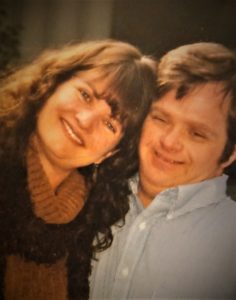 When we were both in our twenties, he developed a passion for fashion. He loved Tom Cruise and Michael Jackson, and he had a subscription to GQ Magazine. There was a moment in his late twenties when Tom Cruise was on the cover of GQ. He held up the magazine next to his face and he said, “I want to look like this guy.” It was so poignant, and in some ways, heartbreaking, because my brother has all the features of a person with Down syndrome and they’re very different than Tom Cruise’s features.
When we were both in our twenties, he developed a passion for fashion. He loved Tom Cruise and Michael Jackson, and he had a subscription to GQ Magazine. There was a moment in his late twenties when Tom Cruise was on the cover of GQ. He held up the magazine next to his face and he said, “I want to look like this guy.” It was so poignant, and in some ways, heartbreaking, because my brother has all the features of a person with Down syndrome and they’re very different than Tom Cruise’s features.
These days, the media celebrates models and actors and artists and athletes with Down syndrome. I wrote an op-ed on the first model with Down syndrome to ever walk the runway at New York Fashion Week for The Oregonian, and I started thinking about what would’ve happened if my brother and I had had social media when we were young, and I could have helped to launch him on YouTube the way that so many young influencers with Down syndrome are launching themselves on social media these days. This was my inspiration.
Diane: I love that. You also mentioned that you have a lisp.
Melissa: I do. It comes and goes. It shows up when I get tired. If I have to do a presentation that’s longer than half an hour, you can hear it. My daughter has several friends with speech differences, as well, and I wanted to represent this, and how it can be catnip to a bully. Daisy’s bully has made her terrified to say anything in class, which is tragic, because this girl has a lot to say.
“I Know So Many People with Two Moms or Two Dads or Trans Parents. All Families Need to Be Represented in Books for Kids”
Diane: What about the two moms?
Melissa: I grew up with a dad and mom until I was nine, and then they got divorced, and my mom got together with a woman she eventually married. I know so many people with two moms or two dads or trans parents. All families need to be represented in books for kids.
Diane: Absolutely.
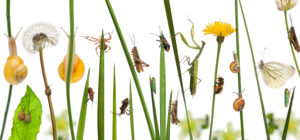 Okay, so what about the bugs? Daisy Woodworm is a budding entomologist. I love that you weave in bug facts and how insects are misunderstood and outcasted too, but they’re invaluable, right? Where would we be without them? And, like many of your characters, they’ve overcome huge obstacles. How did you decide Daisy would be an amateur entomologist?
Okay, so what about the bugs? Daisy Woodworm is a budding entomologist. I love that you weave in bug facts and how insects are misunderstood and outcasted too, but they’re invaluable, right? Where would we be without them? And, like many of your characters, they’ve overcome huge obstacles. How did you decide Daisy would be an amateur entomologist?
Melissa: I think you’re going to love this. Do you remember Cricket Matthews from the eight-week workshop I taught on how to write and sell short personal essays?
Diane: Yes.
Melissa: Cricket was my high school student 15 years ago, when I was teaching at Laurel Springs, an online high school. I was Cricket’s teacher for four years, and they were insect obsessed. So much of their writing for English classes had to do with bugs. We’ve kept in touch over the years, and now, Cricket’s on social media talking about their insects in their house and in the yard. I’ve always thought, “What a cool thing to be obsessed with.” When I went to write Daisy, I remembered Cricket’s obsession . . . and there it is.
“I Love the Idea That Families Can Bring Out the Best in Each Other, and I Wanted to Show That in the Book”
Diane: That’s so great. And etymology just happens to fit beautifully with the themes.
The themes in this book are so big hearted. I wish I had this book when I was a kid because I would have read it over and over and over again. It speaks to so many issues kids go through. It would’ve spoken to me and helped me so much. I’m so excited for all the kids who were going to read this.
I’m going to mention the themes that stood out for me. One is that you’re never too young, too poor, too anything, to have an impact on the world—but you’re not in it alone.
 There has to be what you call cross-pollination. You have to ask for help. We’re here to help each other. What else are we here for?
There has to be what you call cross-pollination. You have to ask for help. We’re here to help each other. What else are we here for?
Then there’s this sense of community and of not giving up. You’re going to have obstacles. Everything that’s meaningful includes obstacles. Think outside the box. Find your way. Of course, there’s the theme of independence. How to manage separation from parents you love and respect. What happens when you make a mistake, and your parents don’t listen to you? How can you remain respectful and still separate? There is navigating friendships and there are first crushes. You know what else is so wonderful? Everybody grows in this book, including the parents.
Melissa: That was important. Kids in middle school begin to realize that their parents aren’t perfect, that they make mistakes, and I wanted to show the parents becoming aware of their flaws and working to fix them after Daisy and Squirrel point them out. I love the idea that families can bring out the best in each other, and I wanted to show that in the book.
“I Really Hope Readers Will Reach Out a Hand in Friendship and Allyship to Kids Who Look Different and Act Different from Them”
Diane: Did I miss any of the themes?
Melissa: I would say there’s one more actually.
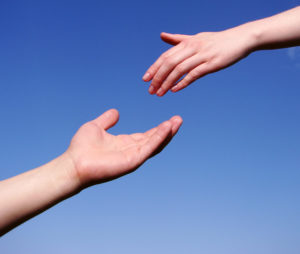 I really hope that readers will reach out a hand in friendship and allyship to kids who look different and act different from them. I was a special education teacher for a while in my 20s, and we had peer tutors come in from the school next door to help with schoolwork or hang out at recess with my third graders who had autism or were otherwise intellectually or physically disabled. My students would go to their classrooms as well. Peer tutoring benefited everyone involved. I would love to catch up with those third graders who are all grown up now and see what impact that experience had on their lives.
I really hope that readers will reach out a hand in friendship and allyship to kids who look different and act different from them. I was a special education teacher for a while in my 20s, and we had peer tutors come in from the school next door to help with schoolwork or hang out at recess with my third graders who had autism or were otherwise intellectually or physically disabled. My students would go to their classrooms as well. Peer tutoring benefited everyone involved. I would love to catch up with those third graders who are all grown up now and see what impact that experience had on their lives.
Diane: That’s so wonderful, because kids, adults with differences are often so isolated. Everybody has something important to offer.
What do you most want your readers to take away from Daisy Woodworm Changes the World?
Melissa: I want them to take away a sense of empowerment. It doesn’t matter if you’re in middle-school; you really do have the ability to change the world for the better in both small and large ways. That’s why I had Daiy’s social studies teacher include so many real life examples of kids who have done incredible things for the environment, and for marginalized communities. I’m not just paying lip service to this idea that kids can change the world. They can, and they are.
Diane: Thank God.
Melissa: I know, right? I adore young people. They’re going to save the world.
“Daisy Will Likely Be Banned in Certain Libraries and Classrooms Because One of the Characters Has Two Moms”
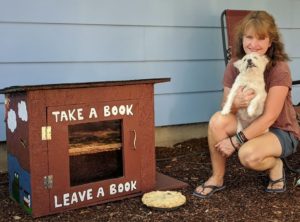 Diane: Because one of your characters has two moms, do you think Daisy will get banned?
Diane: Because one of your characters has two moms, do you think Daisy will get banned?
Melissa: Daisy will likely be banned in certain libraries and classrooms because one of the characters has two moms. I hate book banning, and like so many other authors of kidlit and the teachers and librarians that support them, I’m fighting the good fight. I will tell you, Diane, that when a children’s book is banned, all of the children’s and young adult authors come out on social media to support that book.
Diane: There are all these movements that buy banned books and get them into the hands of kids. It’s a wonderful way to change our crazy world.
Melissa: I’m particularly thrilled with the work being done by the #ReadwithLove campaign through PFLAG, and by We Need Diverse Books, and Book Ban Busters through the women’s activism group Red, Wine, and Blue.
Diane: Some WomenPause readers have children or grandchildren in middle school. Please buy a copy for them—or for yourself! I’m so grateful I read it. The holidays are coming up. Please think about giving it to your kids or your grandkids or anybody you know with a kid or grandkid.
Melissa: Give it to everyone who teaches grades 5-8! Give it to everyone you know who has a kid with a disability, and to middle-school track coaches, and insect-obsessed children . . .
Diane: Suggest it to your librarians. Yes. The list goes on. Everyone should read this.
I ordered your owls book today …
What’s with you and owls?
“I Ended Up at That Raptor Center for Eight Years, Moving from Cleaning Cages and Feeding the Birds to Actually Being an Owl Trainer”
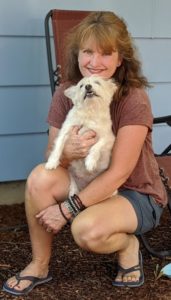 Melissa: When I moved to Oregon from Los Angeles area 21 years ago, I knew nothing about birds of prey. I met this tall, handsome man in the dog park right up the street from where we live now, and there were these birds shrieking overhead and I said, “What are those?” He said they were Cooper’s hawks. They’re raptors. I said, “What’s a raptor?” He turned out to be a volunteer at the local raptor rehabilitation center, and even though I was terrified of beaks and talons, I decided to volunteer, as well.
Melissa: When I moved to Oregon from Los Angeles area 21 years ago, I knew nothing about birds of prey. I met this tall, handsome man in the dog park right up the street from where we live now, and there were these birds shrieking overhead and I said, “What are those?” He said they were Cooper’s hawks. They’re raptors. I said, “What’s a raptor?” He turned out to be a volunteer at the local raptor rehabilitation center, and even though I was terrified of beaks and talons, I decided to volunteer, as well.
I ended up at that raptor center for eight years, moving from cleaning cages and feeding the birds to actually being an owl trainer. I trained their resident snowy owl and their barred owl and their great horned owl for educational presentations, and I would drive around with the owls in the front seat of my car and take them out for scouting troops and classroom visits. Owls are magnificent. They are a reminder of wildness and mystery and they’re just so beautiful.
Diane: You have a real passion for nature.
Melissa: Oh, I do. I do.
Diane: And animals. You live in a great place for that.
Melissa: I do. Oregon has so many wild places, so many mountains and lakes and beaches and deserts.
Diane: You do a lot of hiking and kayaking?
Melissa: I hike and kayak and bicycle and run and cross-country ski. Pretty much everything but downhill ski and surf. But I want to take surfing lessons.
I love to be outside, and I love to be in motion.
“I Had Grown Up on MGM Musicals, So When I Had the Opportunity to Interview a Former Ziegfeld Girl, I Knew Exactly What I Was Getting Into. She Was Magnificent”
Diane: You have been a teacher of mine. A wonderful teacher, and I look to you because I’ve had a bunch of writing published in literary journals, but I’d like to break into more mainstream outlets. You are a goddess of that space. You’ve been in The Washington Post, CNN, The New York Times, Smithsonian, the list goes on and on and on.
At 17, you worked as a freelance reporter for Senior World interviewing extraordinary people over age 55. I love that. Did you know they were extraordinary when you were 17, or did they just seem like old folks?
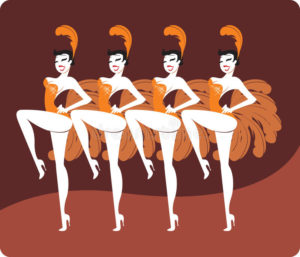 Melissa: Oh gosh, no. My mom was a journalist at Senior World for a while. She got me a part-time gig, and I’d ride my bike or drive my Chevy Nova all over Los Angeles. I had grown up on MGM musicals, so when I had the opportunity to interview a former Ziegfeld Girl, I knew exactly what I was getting into. She was magnificent. I have a good story for you: I was very polite around my elders and I’m interviewing her, and I said, “You are in such excellent shape.” And Diane, she stood up and pulled down her pants and exposed her butt cheek and said, “I do stay in shape. Feel my butt.”
Melissa: Oh gosh, no. My mom was a journalist at Senior World for a while. She got me a part-time gig, and I’d ride my bike or drive my Chevy Nova all over Los Angeles. I had grown up on MGM musicals, so when I had the opportunity to interview a former Ziegfeld Girl, I knew exactly what I was getting into. She was magnificent. I have a good story for you: I was very polite around my elders and I’m interviewing her, and I said, “You are in such excellent shape.” And Diane, she stood up and pulled down her pants and exposed her butt cheek and said, “I do stay in shape. Feel my butt.”
I thought, “Oh dear God. What am I supposed to do?” I had to give it a little poke and say, “You are right. You have a very firm gluteus maximus.”
Another time, I interviewed a paleontologist at the La Brea Tar Pits in Los Angeles about her work excavating saber tooth cat skeletons. That was thrilling. I got to talk with so many fascinating people.
“I Tend to Gravitate Towards Stories About Marginalized Communities. The Community of Older Adults Can Be Marginalized. Ageism Is Sadly Alive and Well in This Society.
Diane: That’s wonderful. Oh, I love that. You’re also an editor at The Writer Magazine.
Melissa: Yes, I’m responsible for two columns a month and six features a year. I just wrote a feature on Priscilla Long and her new book, Dancing with the Muse in Old Age, and we talked all about her anti-ageism crusade, which is now my mission as well.
Diane: As it is mine. I’m interviewing her later today.
Melissa: You are going to love Priscilla.
Diane: I’m sure I will. Tell me about your columns at The Writer.
Melissa: In one, I profile a different literary magazine every month, and in the other, I profile a different literary event or organization of interest to writers. That’s a really fun column to write.
Diane: Are you free to pick which features you want to write about? Whatever interests you?
Melissa: Yes, I tend to gravitate towards stories about marginalized communities. The community of older adults can be marginalized. Ageism is sadly alive and well in this society.
Diane: It is. Even among people who are older.
We’ve internalized a lot of that.
Melissa: Yes. I am going to take care of my 90 year old mother-in-law in Rochester, New York next week, and one of the things we are going to work on is combating her ageist messages to herself.
“I Returned to Middle Grade Right Before My Husband and I Adopted a Child. In Part, I Wrote the Middle-Grade Novel Avenging the Owl for Her”
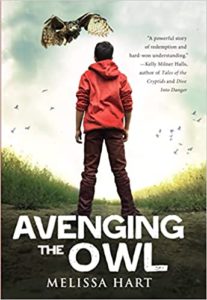 Diane: What got you into writing for young people?
Diane: What got you into writing for young people?
Melissa: I was always interested in writing for a young adult audience. I thought I was writing a young adult novel when I was working on my MFA, and my teacher, Jacqueline Woodson, who’s a really famous young adult/middle grade author, she said, “No, no, you are writing a thinly veiled autobiography.” She was right. I wrote my thesis as a memoir instead and really jumped on the memoir train for about 10 years but got a little tired of that and decided to delve into fiction writing.
I returned to middle grade right before my husband and I adopted a child. In part, I wrote the middle-grade novel Avenging the Owl for her. It really is a love letter to Oregon and the flora and fauna of Oregon, and it also has a main character with Down syndrome, based on my brother. Avenging took me to wonderful places. It was an Oregon Battle of the Books selection, and so I visited schools and libraries, giving presentations. I was a Battle of the Books coach for middle schoolers. I just love middle schoolers.
Diane: I do too.
Melissa: They’re so enthusiastic and delightful and hilarious. I wanted to write another book for them.
Diane: You wanted to write another book for them and there you go. A beautiful, beautiful book.
Melissa: I’m writing a sequel called Kristen Rockefeller Saves the World, about one of the minor characters in the book.
It looks at issues of homelessness and poverty in children and their families, as well as body shaming and bullying.
“I Love Helping People Own Their Stories and Learn to Shape the Elements of Their Stories for a Wide Readership”
I also have a really fun middle grade comic book coming out next year for Macmillan’s Citizen Comics division. I did the text. It’s about media literacy and it teaches middle schoolers to be aware of the ways that media manipulates them and how to tell a true story from a fake story in a myriad of ways. I did the writing; no one wants me to do the art.
Diane: Look at you, changing the world.
Melissa: The main character is a giant talking owl.
Diane: Oh, why am I not surprised?
I’m so excited for all these wonderful things.
You’ve taught kids, and now you teach adults too. How do you like teaching adults?
Melissa: I really love teaching adults to write short personal essays. That’s my favorite subject to teach because I love helping people own their stories and learn to shape the elements of their stories for a wide readership. I think it puts so much good, positive, useful energy out into the world. We’ve got one woman writing about being diagnosed four times with an inoperable fatal brain tumor and healing herself. Another person writing about what it’s like to be misgendered and misnamed and the pain that causes them.
I’m selfish in loving to teach this class because I adore the insights I get from all of these writers about these different topics I couldn’t possibly learn about unless I teach. One woman wrote about the power of walking labyrinths and why to do it and how to do it. I had no idea that was a thing.
“As a Writer, You Have to Have Guts. That’s Why I Love Women Over 50. We Have Guts”
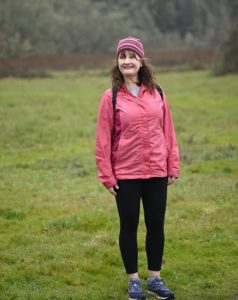 How wonderful to help get those stories out there because they’re inevitably so positive and so empowering. I just adore it. I love to teach adult writers how to get started writing journalistic articles, profiles, roundup articles, things like that … travel articles … I’m not teaching people muckraking journalism, to find the bad and the negative in life and report on it. I’m teaching them to empower themselves and empower others by lifting up their stories and putting them into the world.
How wonderful to help get those stories out there because they’re inevitably so positive and so empowering. I just adore it. I love to teach adult writers how to get started writing journalistic articles, profiles, roundup articles, things like that … travel articles … I’m not teaching people muckraking journalism, to find the bad and the negative in life and report on it. I’m teaching them to empower themselves and empower others by lifting up their stories and putting them into the world.
Diane: That’s wonderful.
I love your classes. I recommend them to everybody.
Do you have any words for people, especially women, over 50 who want to try writing but feel like it’s too late or they’re not good enough?
Melissa: I have so many things to say. What does that even mean, good enough? Good enough for whom? Good enough for what? I think a lot of times, success, if you want to define it as publication and a paycheck, isn’t dependent on whether you’re a seasoned veteran writer, but rather on whether you have a good story and some kind of skill at telling it. The first big essay I ever had published, I had no idea what I was doing. I just had a funny family story to tell, and it got picked up in Woman’s Day. The editor liked it enough that she helped me shape it into something a general audience could enjoy.
As a writer, you have to have guts. That’s why I love women over 50. We have guts. We have the big brass balls, as my mother used to say, that perhaps we didn’t have in our 20s. We’ve withstood rejection and failure, and we know we can survive.
“I Hope to Come Away from Every Presentation Feeling Like I’ve Inspired People to Get Their Voice Out Into the World and Add A Little More Kindness”
If you’re interested in learning more about personal essay writing, there are some phenomenal classes you can take for a little bit of money through the Creative Nonfiction Foundation and through Hugo House, The Loft Literary Center, and GrubStreet. I teach frequently for two wonderful Oregon-based writers’ organizations: Willamette Writers and Wordcrafters in Eugene.
Diane: You run your own classes, as well, such as the 8-week online course I took with you on how to write and sell personal essays.
Melissa: Yes! Also, there are amazing books out there, including Susan Shapiro’s The Byline Bible, and Dinty Moore’s Crafting the Personal Essay and on and on.
There are people in their eighties who sit down and start writing and they get published and they have a best seller. If that’s your goal, take heart. Maybe your goal is to tell wonderful stories for your kids or your grandkids or your neighbor or whatever, but just get yourself a notebook and permission to do it.
Diane: Anything else you want to share?
Melissa: I work as a public speaker in schools from kindergarten to grad school, and in library programs and writers programs. I’ve presented all over the country. I adore meeting new people and creating a safe, supportive community for them. I hope to come away from every presentation feeling like I’ve inspired people to get their voice out into the world and add a little more kindness.
Diane: Thank you. That’s beautiful. You do it. You really do. You’re a real, fun, loving, generous, kind, warm light in this world.
Melissa: Oh my goodness, thank you, Diane. As are you.
Learn more about Melissa Hart’s work at www.melissahart.com, and follow her on Twitter/Instagram/TikTok @WildMelissaHart .
As always, I’d love to hear from you. Write a comment or send me an email.
Thank you so much, again, for your continued support— and if you know anyone else who might like to join us in this space, please send them this link!
And Happy Happy Thanksgiving!
See you soon!
XOXOXO
Diane




What a fantastic inspiring interview! On all levels! Melissa is just what this world needs more of. Thanks, Diane for sharing her with us!
Thank you, Debbie! “Melissa is just what this world needs more of.” I couldn’t agree with you more!!!
Diane, thank you so much for taking the time to talk with me about Daisy Woodworm Changes the World. I hope the book uplifts and inspires both middle-grade readers and their caregivers.
For a list of other books featuring main characters with Down syndrome, go here: https://theabilitytoolbox.com/childrens-books-down-syndrome/
Much gratitude,
Melissa
Thank you for speaking with me, Melissa! Daisy Woodworm Changes the World will uplift and inspire all who read it! XO
What a wonderful, life-affirming interview of a wonderful, life-affirming writer and teacher! I was lucky enough to read an advance copy of “Daisy Wordworm Changes the World” — and I was thrilled to give it a big 5 stars and, of course, pre-order it. Your description of the book and its impact is spot-on. And TODAY, November 8, is its official launch into the world! Which is such a lovely counterpoint to the Other Thing in the news today.
Thank you so much Jan! Interviewing Melissa was a great pleasure! And yes, wonderful counterpoint to The Other Thing!
Thank you so much for reviewing Daisy, Jan . . . and yes, what a counterpoint to Election Day! So grateful for you. –Melissa
Love the interview! I have to get her latest book! My daughter is a freshman in high school, and she has disAbilities. I’d like to read this with her. Thank you for interviewing someone who values marginalized communities. What an important mission as a writer and person. I love your interviews, Diane! Keep writing!
Oh Teri! Thank you so much for this! I can’t imagine a better book for your daughter–and you! (I ADORED it!) So grateful you’re enjoying the interviews–I love to share what these wonderful women are up to! XO
Hi, Teri! Let me know what your daughter thinks of Daisy. You both might like some of the books on this list I compiled, as well: https://theabilitytoolbox.com/childrens-books-down-syndrome/
Cheers!
Melissa
This interview is so uplifting and joyful, a celebration of the unique beauty in all children and families. I’ll have 2 middle school teachers at my Thanksgiving table this year and can’t wait to surprise them with a copy of Daisy Woodworm Changes the World! And one for my family as well:) Thank you Diane and Melissa -your interview has also inspired me to pick up on a children’s book I began writing in 2001….as an adoptive parent, there were woeful amount of cheerful children’s books on how families are made through adoption-book stores and libraries actually shelved them between “death and disabilities”! ( though Sesame Street and Jamie Lee Curtis wrote wonderful children’s books on the subject, I still have them 28 years alter:). Happy, Blessed Thanksgiving XO Marian
Oh Marina! How wonderful that you will be surprising the teachers at your table with Melissa’s book! They will love it, as will you! And soooooo very happy that you are inspired to pick up where you started on your own children’s book! There will be room on the shelf for you beside Melissa Hart, Jamie Lee Curtis, and Sesame Street! Thanks for your uplifting comment!
Marian, thank you so much . . . I hope your teacher friends love Daisy. And I’m an adoptive parent, myself . . . we NEED your children’s book in the world. Let me know how I can be of help.
Cheers!
Melissa Hart
Love your interview Diane. I had such a great experience taking Melissa’s essay class. Her love of life, joyfulness, and whimsical nature were exactly what I needed to help me bring out humor in my own writing. Thank you for giving me this wonderful glimpse into her writing, Trish
Thanks so much, Trish, for your comment and for reading! I agree with everything you said about Melissa and her class! Her joyfulness is wonderfully contagious! Spaeking with her was a great pleasure, as was reading her book!
What a terrific interview! Thank you so much! Diane and Melissa! Daisy Woodworm Changes the World is beautiful, too–and you’ve described it well! The class with Melissa was full of her spirit and encouragement. I loved being apart!
Oh, Debra! Thank you! As I’m sure you can imagine, Melissa was an absolute joy to speak with. And I loved her class so much too!
Oh, thank you so much, Trish. I’m just so excited about your writing. The world needs your stories!
Melissa